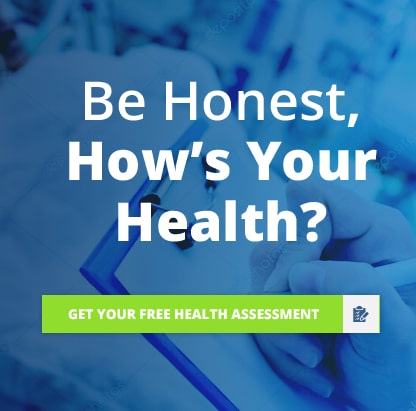Most of us recognize that exercise and health are very tightly linked. Training regularly helps strengthen our muscles, lungs, and heart.
Few would question that exercising regularly leads to a healthier life – but does this mean a longer life? Can the effects of exercise compensate for all the other possible causes of death?
Exercise, Weight and Chronic Disease
The impact of regular physical activity can best be seen through weight management. Your weight alters your risk of three particularly deadly chronic diseases:
Metabolic syndrome
This term encompasses type 2 diabetes and many in-between points, such as insulin resistance, pre-diabetes, and non-alcoholic fatty liver disease. For women, metabolic syndromes may also include hirsutism and polycystic ovarian syndrome (PCOS).
Cardiovascular disease
Cardiovascular disease is another “disease category” that may present itself in different forms and progressively worsen into more severe conditions. Weight-related cardiovascular disease may be as simple as high blood pressure or high cholesterol levels. However, these issues can lead to atherosclerosis, coronary heart disease, and stroke.
Neurodegeneration
Many of the metabolic changes caused by excess weight can speed up the process of cell death. This will progressively damage the central nervous system and open the gate for numerous neurodegenerative conditions such as Alzheimer’s, dementia, and Parkinson’s disease.
When you simply look at the risk of chronic disease, the relationship between exercise and lifespan seems relatively straightforward. Yet, there are many ways to die, and more than one factor at play regarding weight management.
Therefore, the proper questions we need to examine are:
- Is lowering the risk of these conditions statistically significant compared to a higher risk of accidents or other diseases?
- Should we be looking at exercise specifically rather than eating less/calorie intake?
- How much exercise is enough to make a difference?
- Do all types of exercise offer the same effect?
Fortunately, several long-term studies have attempted to answer these questions.
What Research Tells Us: Norway’s Generation 100 Study
In 2020, a group of researchers from Oslo and Trondheim published the results of the Generation 100 study. This was a five-year observational study that sought to compare the effect of routine training on all causes of mortality among the Norwegian elderly.
Study Set-Up
This study examined a group of over 1500 adults, all aged between 73 and 79 when the study started. Participants all lived in Trondheim, a suburban municipality close to Oslo, and they were also all relatively healthy. Anyone with uncontrolled hypertension, dementia, cancer, or physical disabilities was excluded from the study.
All eligible participants were then divided into three groups:
- A control group, which was instructed to follow the average physical activity guidelines issued by the Norwegian government (with 30 minutes of moderate physical activity at least five days a week, or 150 minutes a week).
- A High-Intensity Interval Training (HIIT) group, which would replace two days a week of moderate activity with a 28-minute HIIT session. This consisted of four cycles, each of four minutes of intense exercise at 90% of peak heart rate, followed by 3 minutes of active recovery. This amounted to 146 minutes a week.
- A Moderate-Intensity Continuous Training (MICT) group, which would replace two workouts a week for a longer 50-minute session. This represents 190 minutes per week.
The control group was left mainly to monitor their own exercise throughout the study. Meanwhile, the MICT and HIIT groups met regularly with a sports medicine specialist. They wore heart monitors to help them hit the necessary heart rates.
The results
After five years, approximately 5% of all the participants in the control group had died. The death rate for those in the MICT group was about the same, but only 3% of those in the HIIT group died during the same period.
But what does this mean?
It seems that being physically active does indeed play a role in longevity. Naturally, this all works when we look at averages and large numbers. Once we look at each individual, we still need to account for personal luck or the propensity to other diseases.
Now, 3% versus 5% may not feel like a significant difference. Perhaps more interesting is that the group doing MICT had similar mortality rates as the control group, despite being the one that spent the most time exercising.
This doesn’t mean that long cardio sessions are entirely irrelevant to health or longevity. One of the key points of criticism towards this study is that the guidelines for the control group were very similar to the MICT one, which may have skewed the results. However, the researchers could not order the control group participants to remain sedentary. This would have been unethical, as the link between no exercise and chronic illness is firmly documented.
We should also consider that Norway’s population is, on average, healthier than that of the U.S. They enjoy lower rates of cardiovascular disease, and outdoor exercise plays a vital role in their culture.
Finally, five years is a relatively short period when talking about total lifespans. Maybe, these differences would have become more prominent if the study had recruited younger people or examined them over a longer time.
What Matters in the End
Short bursts of intense activity are capable of pushing our lung capacity further. If you want to reap the most potent benefits in the least amount of time, then a HIIT-based routine will be the obvious choice.
Yet, not all of us are permanently strapped for time – or looking forward to a very intense experience. If long runs or steady hikes are more your jam, then go for them. They provide their own portfolio of physical and mental benefits. If you can add the short sprint here and there, all the better, but don’t skip on your next workout just because it’s not “ideal”!
Think differently about your health with Society of Wellness. Get your free health assessment here.




